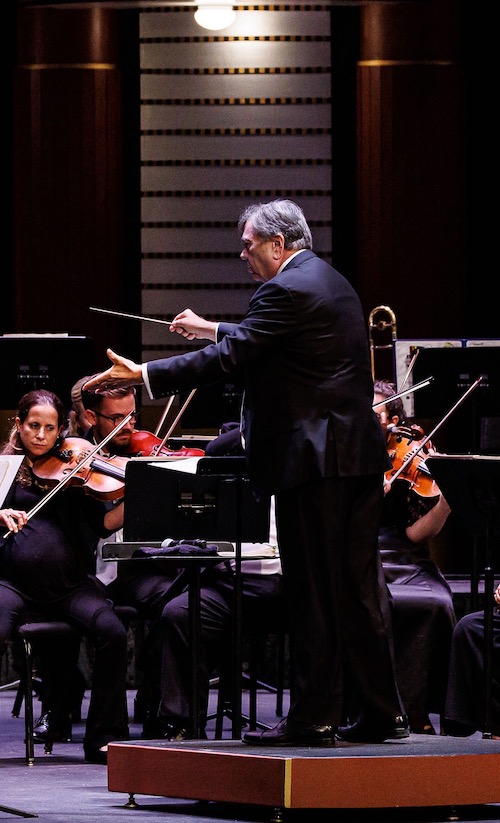A kaleidoscopic premiere and eruptive Stravinsky with Palm Beach Symphony

Gerard Schwarz conducted the Palm Beach Symphony in music of Schwantner, Gershwin and Stravinsky Tuesday night at the Kravis Center. File photo: IndieHouse Films
A world premiere, a renowned pianist and the most accessible thing Anton Webern ever wrote marked Tuesday night’s performance by the Palm Beach Symphony.
The premiere came from the distinguished American composer Joseph Schwantner, who grew up in suburban Chicago and showed an early inclination toward composing. As he recounted from the stage at the Kravis Center in West Palm Beach, during his classical guitar lessons, his habit of altering the notes of pieces he was studying so irritated his teacher that he finally began to just write his own works. He went on to win the 1979 Pulitzer Prize for Music for his Aftertones of Infinity, followed by a string of prestigious commissions.
For the world premiere of Sojourners: Reflections on Thoreau, four percussionists took the stage behind the rest of the orchestra. Their work would turn out to be crucial in creating the texture of this colorful music. In a note from the composer in the program, Schwantner said he was inspired by a few lines of Thoreau’s poetry that read in part, “Through this dark veil, to our music time will linger, and earth opens wide her ear.”
With its rich orchestral palette and series of dramatic episodes, the work came off as a modernistic, rural New England cousin to Scheherazade. The quiet opening, with timpani rolls and long notes in the strings, created a sense of expectation. Next came eerie dissonant music, violent drum rolls, and light motifs that flitted through the wind section like hummingbirds. Through it all, the percussionists provided crucial color, from subtle effects from gong, bells and mallet instruments to sharp drum raps that cut through the sound of the rest of the orchestra.
Conducted by Gerard Schwarz, the orchestra gave a vivid, energetic performance. The work was commissioned by Bonnie McElveen-Hunter, former U.S. ambassador to Finland and a Palm Beach resident, in honor of Dr. Joel Kassimir.
The pianist Misha Dichter, the latest in the series of star soloists that have enlivened the orchestra’s current season, took the stage for Gershwin’s Concerto in F.
Dichter’s performance was respectable but didn’t produce the high-energy moments really needed to bring this brilliant showpiece off. From the opening, the orchestra sounded more subdued than buoyant. Dichter played with effortless skill, appearing to have no trouble with the fastest, most intricate passages. Musically he played it fairly straight, not overdoing the jazzy quality of the music, but never played in a rote manner, just letting the music speak for itself.
In some of the big melodies of the first and last movements, the orchestra could have injected more juice, heft and feeling into the playing. Yet at times, such as the reappearance of the opening melody at the end of the first and last movements, the orchestra drowned out Dichter’s playing completely, eliminating the crucial percussive clang of the piano from those passages.
As an encore, Dichter gave a delicate performance of Debussy’s Clair de Lune.
Anton Webern’s 1905 quartet movement Langsamer Satz surprises many listeners with the Romantic lyricism produced by a composer who would go on to write some of the most spare, austere works of the twelve-tone era.
Schwarz arranged the work for full orchestra with the title Adagio, producing an effective reimagination of a work composed by Webern at the age of 21 in the heat of his love for the woman he would later marry. The addition of winds, in particular, lent poignance to the swirling, turbulent music. With trombones, full string sections and the rest, this already passionate work felt emotionally supercharged.
The concert ended with a performance of Stravinsky’s Firebird Suite. This is virtuoso orchestral music, demanding a high level of skill in fast passages, with complex combinations of instruments and exposed solo melodies.
The orchestra gave a highly polished performance, with a glossy sheen on passages such as the ominous opening notes, the solo oboe music and the bassoon melody topped by glassy violin sounds. But there was also an uncivilized edge to the performance, which seemed right for music rooted in Russian folk tales.
The opening of the Danse infernale movement came with such an abrupt drumbeat that people visibly jumped in their seats, and the movement hurtled forward in a performance that was full of rhythmic drive.
The Palm Beach Symphony’s next concert will be 8 p.m. April 16, with Gerard Schwarz conducting and Joshua Bell as violin soloist. The program will include Mendelssohn’s Hebrides Overture and Violin Concerto, as well as Beethoven’s Symphony No. 3 “Eroica.” palmbeachsymphony.org.
Posted in Performances
Leave a Comment
Wed Mar 15, 2023
at 11:37 am
No Comments






